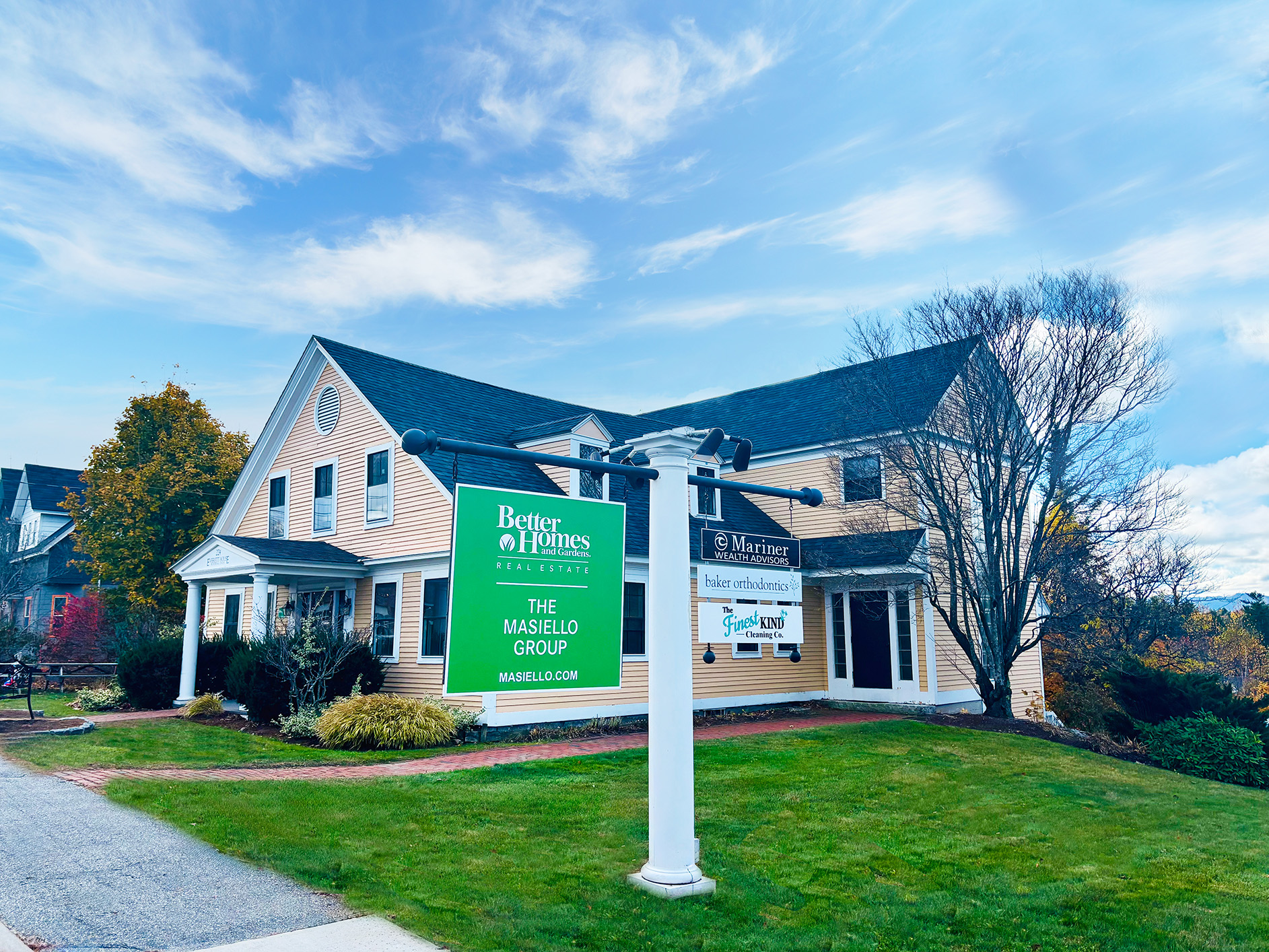New listing and a great in-town home. Walk to the New London Barn Playhouse for summer shows and pick up your flowers and vegetables at Spring Ledge Farm. Completely renovated and updated. Beautiful, insulated sun room was added in 2008. Home is where the heart is! Visit www.RenovatedCape.com for more photos and details. Offered at $249,900.
p style="text-align: center;">Great year-round or vacation property. Close to Mt. Sunapee for skiing or Mt. Sunapee State Park for fun in the sun and sand. Post and beam 3 bedroom home, nice level yard, feel the warmth of the wood stove on those quiet, snowy days. For more photos and details, visit www.74BradfordRd.com.
Sip a cold summer drink while relaxing on the porch, taking in the expansive lake and mountain views. This lakefront home has been exquisitely renovated with all high-end products. Boathouse and large lakeside patio. A wonderful home to begin your memories at the lake. For more photos and details, visit www.Shorenough.com.
You'll feel warm and cozy in this classic New England Farmhouse with beamed ceilings, wide pine floors, raised panel doors and more. Wonderful original features throughout. Level, open lot with established gardens and apple and pear trees. Was $424,000., now offered at $375,000. For more photos and details, visit www.27ShakerSt.com.
 1. Tax breaks. The U.S. Tax Code lets you deduct the interest you pay on your mortgage, your property taxes, as well as some of the costs involved in buying your home.
1. Tax breaks. The U.S. Tax Code lets you deduct the interest you pay on your mortgage, your property taxes, as well as some of the costs involved in buying your home.
2. Appreciation. Real estate has long-term, stable growth in value. While year-to-year fluctuations are normal, median existing-home sale prices have increased on average 6.5 percent each year from 1972 through 2005, and increased 88.5 percent over the last 10 years, according to the NATIONAL ASSOCIATION OF REALTORS®. In addition, the number of U.S. households is expected to rise 15 percent over the next decade, creating continued high demand for housing.
3. Equity. Money paid for rent is money that you’ll never see again, but mortgage payments let you build equity ownership interest in your home.
4. Savings. Building equity in your home is a ready-made savings plan. And when you sell, you can generally take up to $250,000 ($500,000 for a married couple) as gain without owing any federal income tax.
5. Predictability. Unlike rent, your fixed-mortgage payments don’t rise over the years so your housing costs may actually decline as you own the home longer. However, keep in mind that property taxes and insurance costs will increase.
6. Freedom. The home is yours. You can decorate any way you want and benefit from your investment for as long as you own the home.
7. Stability. Remaining in one neighborhood for several years gives you a chance to participate in community activities, lets you and your family establish lasting friendships, and offers your children the benefit of educational continuity.
Online resources: To calculate whether buying is the best financial option for you, use the “Buy vs. Rent” calculator at www.GinnieMae.gov .
Original source: Realtor.org in REALTORMag, the Business Tool for Real Estate Professionals
By: G. M. Filisko Published: March 30, 2010 You’ve found your dream home. Make sure missteps don’t prevent a successful closing. 1. Be truthful on your mortgage application You may think fudging your income a little or omitting debts when applying for a mortgage will go unnoticed. Not true. Lenders have become more diligent in verifying information on mortgage applications. If you fib, expect to be found out and denied the loan you need to fund your home purchase. Plus, intentionally lying on a mortgage application is a crime. 2. Hold off on big purchases Lenders double-check buyers’ credit right before the closing to be sure their financial condition hasn’t weakened. If you’ve opened new credit cards, significantly increased the balance on existing cards, taken out new loans, or depleted your savings, your credit score may have dropped enough to make your lender change its mind on funding your home loan. Although it’s tempting to purchase new furniture and other items for your new home, or even a new car, wait until after the closing. 3. Keep your job The lender may refuse to fund your loan if you quit or change jobs before you close the purchase. The time to take either step is after a home closing, not before. 4. Meet contingencies If your contract requires you to do something before the sale, do it. If you’re required to secure financing, promptly provide all the information the lender requires. If you must deposit additional funds into escrow, don’t stall. If you have 10 days to get a home inspection, call the inspector immediately. 5. Consider deadlines immovable Get your funds together a week or so before the closing, so you don’t have to ask for a delay. If you’ll need to bring a certified check to closing, get it from the bank the day before, not the day of, your closing. Treat deadlines as sacrosanct. More from HouseLogicHow maintenance adds to home valuesReducing closing stressOther web resourcesMore on calculating closing costsMore on the closing process G.M. Filisko is an attorney and award-winning writer who wanted a successful closing on a Wisconsin property so bad that she probably made her agent rethink going into real estate. A frequent contributor to many national publications including Bankrate.com, REALTOR® Magazine, and the American Bar Association Journal, she specializes in real estate, business, personal finance, and legal topics.
By: G. M. Filisko Published: February 10, 2010 By doing your homework before you buy, you’ll feel more content about your new home. 1. Decide how much home you can afford Generally, you can afford a home priced 2 to 3 times your gross income. Remember to consider costs every homeowner must cover: property taxes, insurance, maintenance, utilities, and community association fees, if applicable, as well as costs specific to your family, such as day care if you plan to have children. 2. Develop your home wish list Be honest about which features you must have and which you’d like to have. Handicap accessibility for an aging parent or special needs child is a must. Granite countertops and stainless steel appliances are in the bonus category. Come up with your top-five must-haves and top-five wants to help you focus your search and make a logical, rather than emotional, choice when home shopping. 3. Select where you want to live Make a list of your top-five community priorities, such as commute time, schools, and recreational facilities. Ask your REALTOR® to help you identify three to four target neighborhoods based on your priorities. 4. Start saving Have you saved enough money to qualify for a mortgage and cover your downpayment? Ideally, you should have 20% of the purchase price set aside for a downpayment, but some lenders allow as little as 5% down. A small downpayment preserves your savings for emergencies. However, the lower your downpayment, the higher the loan amount you’ll need to qualify for, and if you still qualify, the higher your monthly payment. Your downpayment size can also influence your interest rate and the type of loan you can get. Finally, if your downpayment is less than 20%, you’ll be required to purchase private mortgage insurance. Depending on the size of your loan, PMI can add hundreds to your monthly payment. Check with your state and local government for mortgage and downpayment assistance programs for first-time buyers. 5. Ask about all the costs before you sign A downpayment is just one homebuying cost. Your REALTOR® can tell you what other costs buyers commonly pay in your area—including home inspections, attorneys’ fees, and transfer fees of 2% to 7% of the home price. Tally up the extras you’ll also want to buy after you move-in, such as window coverings and patio furniture for your new yard. 6. Get your credit in order A credit report details your borrowing history, including any late payments and bad debts, and typically includes a credit score. Lenders lean heavily on your credit report and credit score in determining whether, how much, and at what interest rate to lend for a home. Most require a minimum credit score of 620 for a home mortgage. You’re entitled to free copies of your credit reports annually from the major credit bureaus: Equifax, Experian, and TransUnion. Order and then pore over them to ensure the information is accurate, and try to correct any errors before you buy. If your credit score isn’t up to snuff, the easiest ways to improve it are to pay every bill on time and pay down high credit card debt. 7. Get prequalified Meet with a lender to get a prequalification letter that says how much house you’re qualified to buy. Start gathering the paperwork your lender says it needs. Most want to see W-2 forms verifying your employment and income, copies of pay stubs, and two to four months of banking statements. If you’re self-employed, you’ll need your current profit and loss statement, a current balance sheet, and personal and business income tax returns for the previous two years. Consider your financing options. The longer the loan, the smaller your monthly payment. Fixed-rate mortgages offer payment certainty; an adjustable-rate mortgage offers a lower monthly payment. However, an adjustable-rate mortgage may adjust dramatically. Be sure to calculate your affordability at both the lowest and highest possible ARM rate. More from HouseLogicLearn how Fannie Mae and Freddie Mac mortgages can help you save on financingLearn more about the costs of homeownershipOther web resourcesHomebuyer counseling resourcesGet a free credit report from each of the three credit reporting bureaus G.M. Filisko is an attorney and award-winning writer who has thrice survived the homebuying process. A frequent contributor to many national publications including Bankrate.com, REALTOR® Magazine, and the American Bar Association Journal, she specializes in real estate, business, personal finance, and legal topics. Visit Houselogic.com for more articles like this. Reprinted from HouseLogic.com with permission of the NATIONAL ASSOCIATION OF REALTORS®.
By: G. M. Filisko Published: February 10, 2010 A solid game plan can help you narrow your homebuying search to find the best home for you. 1. Know thyself Understand the type of home that suits your personality. Do you prefer a new or existing home? A ranch or a multistory home? If you’re leaning toward a fixer-upper, are you truly handy, or will you need to budget for contractors? 2. Research before you look List the features you most want in a home and identify which are necessities and which are extras. Identify three to four neighborhoods you’d like to live in based on commute time, schools, recreation, crime, and price. Then hop onto REALTOR.com to get a feel for the homes available in your price range in your favorite neighborhoods. Use the results to prioritize your wants and needs so you can add in and weed out properties from the inventory you’d like to view. 3. Get your finances in order Generally, lenders say you can afford a home priced two to three times your gross income. Create a budget so you know how much you’re comfortable spending each month on housing. Don’t wait until you’ve found a home and made an offer to investigate financing. Gather your financial records and meet with a lender to get a prequalification letter spelling out how much you’re eligible to borrow. The lender won’t necessarily consider the extra fees you’ll pay when you purchase or your plans to begin a family or purchase a new car, so shop in a price range you’re comfortable with. Also, presenting an offer contingent on financing will make your bid less attractive to sellers. 4. Set a moving timeline Do you have blemishes on your credit that will take time to clear up? If you already own, have you sold your current home? If not, you’ll need to factor in the time needed to sell. If you rent, when is your lease up? Do you expect interest rates to jump anytime soon? All these factors will affect your buying, closing, and moving timelines. 5. Think long term Your future plans may dictate the type of home you’ll buy. Are you looking for a starter house with plans to move up in a few years, or do you hope to stay in the home for five to 10 years? With a starter, you may need to adjust your expectations. If you plan to nest, be sure your priority list helps you identify a home you’ll still love years from now. 6. Work with a REALTOR® Ask people you trust for referrals to a real estate professional they trust. Interview agents to determine which have expertise in the neighborhoods and type of homes you’re interested in. Because homebuying triggers many emotions, consider whether an agent’s style meshes with your personality. Also ask if the agent specializes in buyer representation. Unlike listing agents, whose first duty is to the seller, buyers’ reps work only for you even though they’re typically paid by the seller. Finally, check whether agents are REALTORS®, which means they’re members of the NATIONAL ASSOCIATION OF REALTORS®. NAR has been a champion of homeownership rights for more than a century. 7. Be realistic It’s OK to be picky about the home and neighborhood you want, but don’t be close-minded, unrealistic, or blinded by minor imperfections. If you insist on living in a cul-de-sac, you may miss out on great homes on streets that are just as quiet and secluded. On the flip side, don’t be so swayed by a “wow” feature that you forget about other issues—like noise levels—that can have a big impact on your quality of life. Use your priority list to evaluate each property, remembering there’s no such thing as the perfect home. 8. Limit the opinions you solicit It’s natural to seek reassurance when making a big financial decision. But you know that saying about too many cooks in the kitchen. If you need a second opinion, select one or two people. But remain true to your list of wants and needs so the final decision is based on criteria you’ve identified as important. More from HouseLogicHOAs: What You Need to Know About RulesA Financial Plan for Your HomeWhen It Pays to Do It Yourself G.M. Filisko is an attorney and award-winning writer who has found happiness in a brownstone in a historic Chicago neighborhood. A frequent contributor to many national publications including Bankrate.com, REALTOR® Magazine, and the American Bar Association Journal, she specializes in real estate, business, personal finance, and legal topics. Visit Houselogic.com for more articles like this. Reprinted from HouseLogic.com with permission of the NATIONAL ASSOCIATION OF REALTORS®.
Article By: G. M. Filisko
Published: March 11, 2010
By knowing how much mortgage you can handle, you can ensure that home ownership will fit in your budget.
1. The general rule of mortgage affordability
As a rule of thumb, you can typically afford a home priced two to three times your gross income. If you earn $100,000, you can typically afford a home between $200,000 and $300,000.
To understand how that rule applies to your particular financial situation, prepare a family budget and list all the costs of homeownership, like property taxes, insurance, maintenance, utilities, and community association fees, if applicable, as well as costs specific to your family, such as day care costs.
2. Factor in your downpayment
How much money do you have for a downpayment? The higher your downpayment, the lower your monthly payments will be. If you put down at least 20% of the home's cost, you may not have to get private mortgage insurance, which costs hundreds each month. That leaves more money for your mortgage payment.
The lower your downpayment, the higher the loan amount you’ll need to qualify for and the higher your monthly mortgage payment.
3. Consider your overall debt
Lenders generally follow the 28/41 rule. Your monthly mortgage payments covering your home loan principal, interest, taxes, and insurance shouldn’t total more than 28% of your gross annual income. Your overall monthly payments for your mortgage plus all your other bills, like car loans, utilities, and credit cards, shouldn’t exceed 41% of your gross annual income.
Here’s how that works. If your gross annual income is $100,000, multiply by 28% and then divide by 12 months to arrive at a monthly mortgage payment of $2,333 or less. Next, check the total of all your monthly bills including your potential mortgage and make sure they don’t top 41%, or $3,416 in our example.
4. Use your rent as a mortgage guide
The tax benefits of homeownership generally allow you to afford a mortgage payment—including taxes and insurance—of about one-third more than your current rent payment without changing your lifestyle. So you can multiply your current rent by 1.33 to arrive at a rough estimate of a mortgage payment.
Here’s an example. If you currently pay $1,500 per month in rent, you should be able to comfortably afford a $2,000 monthly mortgage payment after factoring in the tax benefits of homeownership.
However, if you’re struggling to keep up with your rent, consider what amount would be comfortable and use that for the calculation instead.
Also consider whether or not you’ll itemize your deductions. If you take the standard deduction, you can’t also deduct mortgage interest payments. Talking to a tax adviser, or using a tax software program to do a “what if” tax return, can help you see your tax situation more clearly.
More from HouseLogic
More on the mortgage interest deduction
More on the tax advantages of homeownership
Other web resources
A worksheet on home affordability
Freddie Mac information on home affordability
G.M. Filisko is an attorney and award-winning writer who’s owned her own home for more than 20 years. A frequent contributor to many national publications including Bankrate.com, REALTOR® Magazine, and the American Bar Association Journal, she specializes in real estate, business, personal finance, and legal topics. Visit Houselogic.com for more articles like this. Reprinted from HouseLogic.com with permission of the NATIONAL ASSOCIATION OF REALTORS®
Michele Lerner, author of Homebuying: Tough Times, First Time, Any Time, offers reasons why real estate is likely to improve in 2011. Here are five reasons she thinks consumers should consider a home purchase this year: ▪ Mortgage rates will stay low. Even with rates climbing — maybe to as high as 6 percent by 2012 — they are still well below where they have been historically. ▪ Tax cuts could help. Extending the tax cuts could encourage a more rapid recovery for the economy. ▪ Americans want to be home owners. A recent Fannie Mae survey showed that Americans still believe a home is a safe and desirable investment. ▪ Builders are about to begin building. Home builders have been sitting on the sidelines. This year, they think pent-up demand will create an appetite for new homes. ▪ Homes are shrinking. Homes are getting smaller, which has made them more affordable. Source: Investopedia, Michele Lerner (12/24/2010)








